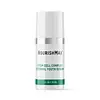What's inside
What's inside
 Key Ingredients
Key Ingredients

 Benefits
Benefits

 Concerns
Concerns

 Ingredients Side-by-side
Ingredients Side-by-side

Water
Skin ConditioningPentylene Glycol
Skin ConditioningCoco-Caprylate
EmollientLecithin
EmollientSodium Polyacrylate
AbsorbentCaprylic/Capric Triglyceride
MaskingHydrolyzed Collagen
EmollientRosa Damascena Flower Water
MaskingPropylene Glycol
HumectantCrambe Maritima Extract
Skin ProtectingEthylhexylglycerin
Skin ConditioningSodium Hyaluronate
HumectantPerilla Frutescens Leaf Extract
MaskingPunica Granatum Flower Extract
Skin ConditioningTerminalia Ferdinandiana Fruit Extract
AntioxidantHimanthalia Elongata Extract
Skin ProtectingCrithmum Maritimum Extract
Skin ConditioningGigartina Stellata Extract
Skin ProtectingLaminaria Saccharina Extract
Skin ProtectingPalmaria Palmata Extract
Skin ProtectingWater, Pentylene Glycol, Coco-Caprylate, Lecithin, Sodium Polyacrylate, Caprylic/Capric Triglyceride, Hydrolyzed Collagen, Rosa Damascena Flower Water, Propylene Glycol, Crambe Maritima Extract, Ethylhexylglycerin, Sodium Hyaluronate, Perilla Frutescens Leaf Extract, Punica Granatum Flower Extract, Terminalia Ferdinandiana Fruit Extract, Himanthalia Elongata Extract, Crithmum Maritimum Extract, Gigartina Stellata Extract, Laminaria Saccharina Extract, Palmaria Palmata Extract
Ingredients Explained
These ingredients are found in both products.
Ingredients higher up in an ingredient list are typically present in a larger amount.
Ethylhexylglycerin (we can't pronounce this either) is commonly used as a preservative and skin softener. It is derived from glyceryl.
You might see Ethylhexylglycerin often paired with other preservatives such as phenoxyethanol. Ethylhexylglycerin has been found to increase the effectiveness of these other preservatives.
Lecithin is a term for a group of substances found in the cell membranes of plants, animals, and humans. They are made up of mixture of phospholipids.
This ingredient has emollient and emulsifying properties.
As an emollient, lecithen helps soften the skin and creates a barrier to keep moisture in.
As an emulsifier, it also helps prevent water and oil ingredients from separating. Lecithin can also help ingredients be better absorbed by the skin.
This is because the phospholipids in lecithin produce liposomes. Liposomes help other ingredients get through the skin barrier.
Depending on the source of this ingredient, lecithin may not be fungal acne safe. This is because some sources of lecithin come from soybean oil, which may feed the malassezia yeast that feeds fungal acne.
We recommend reaching out to the brand you are purchasing from to inquire about the source of their lecithin.
Some other names for this ingredient include soy lecithin and deoiled soy lecithin.
Learn more about LecithinPropylene Glycol is an odorless, colorless liquid. As a humectant, it helps skin retain moisture. It also aids in delivering active ingredients.
Another role of this ingredient is preventing a product from melting or freezing. Propylene glycol also adds antimicrobrial properties to a product, elongating product lifespan.
This ingredient is considered an organic alcohol and commonly added into both cosmetics and foods.
Those with sensitive skin or conditions may develop a rash when using this ingredient.
Learn more about Propylene GlycolSodium Hyaluronate is hyaluronic acid's salt form. It is commonly derived from the sodium salt of hyaluronic acid.
Like hyaluronic acid, it is great at holding water and acts as a humectant. This makes it a great skin hydrating ingredient.
Sodium Hyaluronate is naturally occurring in our bodies and is mostly found in eye fluid and joints.
These are some other common types of Hyaluronic Acid:
Learn more about Sodium HyaluronateWater. It's the most common cosmetic ingredient of all. You'll usually see it at the top of ingredient lists, meaning that it makes up the largest part of the product.
So why is it so popular? Water most often acts as a solvent - this means that it helps dissolve other ingredients into the formulation.
You'll also recognize water as that liquid we all need to stay alive. If you see this, drink a glass of water. Stay hydrated!
Learn more about Water